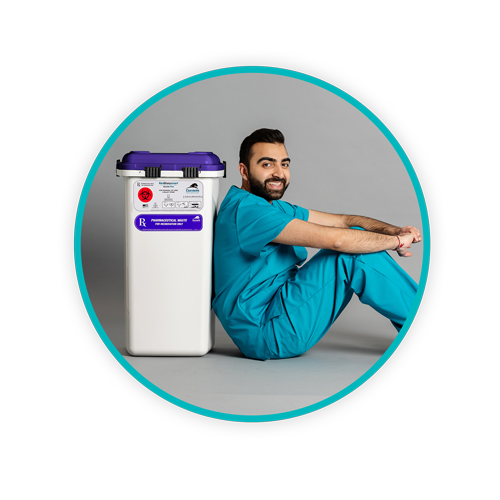Streamlined Process: How to Obtain a Pharmaceutical Disposal Agreement

Proper pharmaceutical disposal is crucial for preventing environmental damage and the misuse of medications. A streamlined process for obtaining a pharmaceutical disposal agreement in the healthcare sector ensures that facilities manage their pharmaceutical waste efficiently and in compliance with regulations. This guide outlines the steps to obtain such an agreement, emphasizing the importance of correct waste categorization and compliance with federal, state, and local regulations.
TOPICS WE WILL COVER:
1 / Identifying Types of Pharmaceuticals for Disposal
2 / Understanding Regulatory Requirements
3 / Choosing a Compliant Disposal Service
4 / Drafting and Signing a Disposal Agreement
5 / Training and Documentation
6 / Regular Review and Audit — Preventing Improper Disposal
7 / Your Compliant Provider: Daniels Health
8 / Pharmasmart Pharmaceutical Waste Container
Identifying Types of Pharmaceuticals for Disposal
Clarifying Pharmaceutical Waste
Pharmaceutical waste includes expired, contaminated, and unused medications, vaccines, and other drugs. It is essential to correctly categorize pharmaceutical waste to ensure proper disposal. Controlled substances, for instance, require more stringent handling and disposal procedures compared to other prescribed medications.
Disposal of Medications: Controlled Substances
Controlled substances, regulated by the DEA, must be disposed of in compliance with specific regulations to prevent diversion and misuse. Other prescribed medications, while less regulated, still require proper disposal to avoid environmental contamination.
Understanding Regulatory Requirements
Federal Laws
The DEA and EPA regulate the disposal of pharmaceuticals at the federal level. The DEA oversees the disposal of controlled substances under the Controlled Substances Act (CSA), requiring entities to register and follow strict disposal protocols (US EPA) (DEA Diversion Control). The EPA enforces regulations under the Resource Conservation and Recovery Act (RCRA) for hazardous pharmaceutical waste, prohibiting disposal into sewage systems and ensuring safe environmental practices (DEA Diversion Control). Unwanted, contaminated, or expired medication that is not specifically listed as hazardous or exhibiting hazardous charcteristics would be considered non-hazardous.
State and Local Regulations
In addition to federal regulations, each state may have specific guidelines for pharmaceutical waste disposal. Healthcare facilities must adhere to these local laws, which can be found through state health departments and environmental agencies. Visit our service map for more detailed information on applicable regulations for the healthcare waste disposal process in your state of residence.
Choosing a Compliant Disposal Service
Criteria for Selecting Disposal Companies
When selecting a disposal service, choosing a company that specializes in pharmaceutical waste and complies with all relevant regulations is essential. The service should provide secure containers, transportation, and disposal methods that meet DEA and EPA standards.
Emphasis on Compliance
A compliant disposal service ensures adherence to federal and state regulations, providing documentation and support to maintain legal standards. Daniels Health, for example, offers secure and compliant disposal services, using our tamper-proof, reusable Pharmasmart containers and secure transportation methods to prevent unauthorized access to unused drugs and ensure regulatory compliance for non-hazardous pharmaceutical disposal.
Drafting and Signing a Disposal Agreement
Key Components of a Disposal Agreement
A comprehensive disposal agreement should include detailed service descriptions, compliance assurances, liability clauses, and clear terms for pickup and disposal schedules. This ensures both parties understand their responsibilities and the scope of services provided.
Training and Documentation
Importance of Staff Training
Proper training for healthcare workers on disposal procedures and regulatory compliance is crucial to ensure the protection of human health and the environment. This includes understanding how to segregate pharmaceutical waste, use disposal containers correctly, and follow emergency procedures in case of spills or contamination.
Role of Documentation
Maintaining accurate documentation is vital for compliance. Records of waste disposal, staff training, and regulatory audits should be meticulously kept to ensure adherence to legal requirements and facilitate regulatory inspections.
Regular Review and Audit—Preventing Improper Disposal
Necessity for Regular Audits
Regular audits of disposal practices help identify compliance issues and areas for improvement. This proactive approach ensures that disposal methods remain compliant with evolving regulations and industry standards.
Your Compliant Provider: Daniels Health
Daniels Health as a Leading Example
Daniels Health provides secure and compliant pharmaceutical waste disposal services that meet the highest standards of security and regulatory compliance. Their approach includes using security-designed containers that prevent tampering, secure pickups with their own trucks, and comprehensive compliance reporting.
Comprehensive Services
Daniels Health supports healthcare facilities with educational materials to help staff segregate hazardous from non-hazardous waste pharmaceuticals effectively. They offer cost-effective solutions with customized waste pickup schedules and transparent contracts, making them a preferred partner for many healthcare facilities across the United States.
Pharmasmart Pharmaceutical Waste Container
The Pharmasmart by Daniels Health is the first reusable non-hazardous pharmaceutical waste bin designed to safeguard against unauthorized access to unused medicine.
Equipped with permanent security locks and lockable wall-mounting brackets, Pharmasmart sets a new standard in pharmaceutical waste management by preventing unauthorized removal or retrieval of unused pharmaceuticals. Its innovative design includes anti-shatter material, hands-free disposal features, and overfill protection, ensuring safe and efficient disposal of non-hazardous pharmaceuticals.
Pharmasmart not only enhances security but also supports compliance with federal and state regulations, making it an ideal solution for healthcare facilities focused on safety and minimizing environmental impact.
Useful Resources
- DEA Office of Diversion Control
- EPA Guidelines on Pharmaceutical Waste
- Daniels Health Service Map: Local Regulations
Experience the Daniels Difference
Daniels Health collaborates closely with each facility to assess, analyze, and optimize their pharmaceutical waste management processes. We offer comprehensive solutions for the classification and disposal of both hazardous waste pharmaceuticals (RCRA) and non-hazardous pharmaceuticals, identifying the most cost-effective methods for collection, pick-up, and disposal.
Our waste classification portal ensures customers have access to the latest drug classifications, meeting state and federal compliance requirements and providing detailed reports of all collected and shipped pharmaceuticals. Daniels Health supports your facility's pharmaceutical waste management needs, ensuring traceability and compliance throughout the entire process.
Contact us today to learn more about partnering with Daniels Health for the compliant and safe disposal of pharmaceutical waste in your area.
Frequently Asked Questions

How to Obtain a Pharmaceutical Waste Disposal Agreement - Common Questions:
Q: What types of pharmaceutical waste need special handling?
A: Controlled substances, hazardous drugs, and chemotherapy waste require special handling and disposal methods as per DEA and EPA regulations.
Q: How can Daniels Health help my facility stay compliant?
A: Daniels Health provides secure disposal services, compliance reporting, and educational materials to ensure your facility meets all regulatory requirements.
